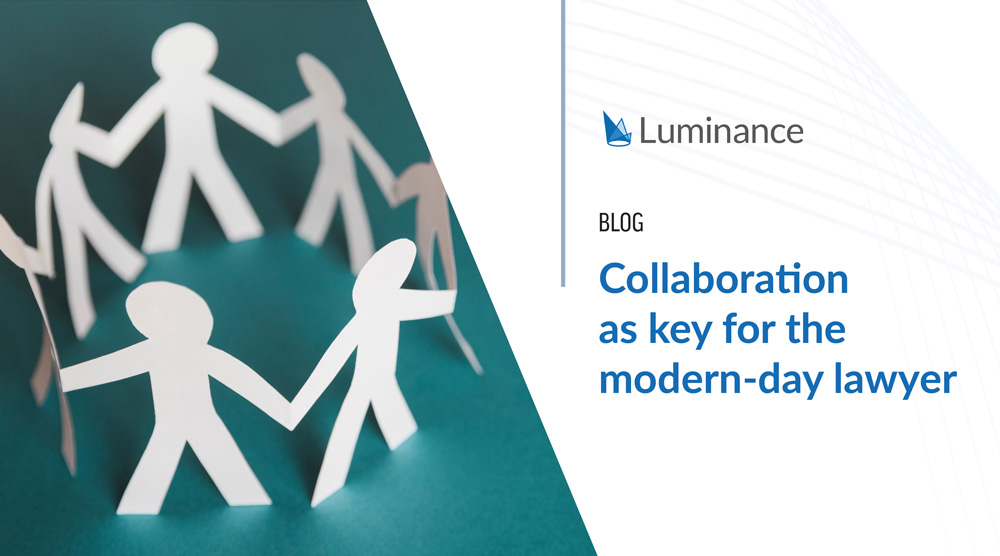
Blog
Collaboration as key for the modern-day lawyer
29 November 2019 | Luminance
Legal specialisation, the globalised nature of businesses and law firms, as well as the increased complexity of client’s issues, means the need for legal advisors to collaborate is greater than ever. More and more transactions are cross-border, cross-jurisdictional and multilingual, meaning legal teams have to work together even if they don’t share a common language, are located in different offices, or different countries. Multidisciplinary teamwork, outsourcing and cross-border work is the new norm for our trusted advisors. By using Luminance, advisors can rest assured collaboration is at the heart of the legal process.
The challenges of collaboration
However, being collaborative can be difficult. From our customers, we have learnt that senior associates leading on a Due Diligence exercise can spend up to 60% of their time on administrative tasks. Activities such as scoping, assigning tasks and collating the various contributions into a report making the review process unnecessarily complex if carried out manually. Advisors therefore risk slowing down, losing control of their understanding of the material issues and compromising the efficiency of their review.
The call for LegalTech
Running alongside this renewed interest and need for cooperative practices is legal technology. Luminance’s core technology, ‘LITE’ (Legal Inference Transformation Engine), is unlike any other platform on the market because lawyers do not have to cede control to a machine. The minimal setup and lack of machine ‘training’ required, combined with LITE’s machine learning capabilities, means the platform works alongside the lawyers to supercharge their review, rather than taking their place. The collaborative workflow tools built on top of the core engine are specific to each legal thought process, from due diligence to litigation, arbitration and disputes, allowing lawyers to redirect their focus onto meaningful, higher-value tasks. It is no longer necessary to allow the administrative burden of collaboration to get in the way of the deepening understanding of the client’s legal issues.
LITE immediately reads and understands huge volumes of data in any language and from any jurisdiction, and then displays and categorises the data in an intuitive and visual way. This allows teams to work seamlessly and efficiently in a multilingual, multijurisdictional data room. Indeed, over 40% of Luminance’s customers work predominantly in non-English languages.
By immediately identifying areas of importance or potential risk, advisors can then capitalise on LITE’s project management features to delegate tasks where they see fit. Whether it be a colleague or an outsourced lawyer with specialist expertise, LITE enhances communications across organisations, countries and continents. As LITE learns from its interactions with various contributors, the technology accelerates the review, refining its understanding and proactively tagging and suggesting concepts of relevance.
The software enables advisors to organise tasks and then track and report on work progression means advisors don’t lose sight of the process and secures a tighter loop with advisors and clients. This is a big leap from using excel spreadsheets to monitor and organise workflow. Luminance allows a range of professionals to share their much-valued experience in a way that adds to rather than disrupts the legal process. In fact, teams can expect to experience at least 50% of time-savings on day one of the review.
With the power to speed up review and manage teams more efficiently, lawyers can free up time to concentrate on higher value tasks such as communicating and collaborating with their client, building their relationships and bettering their understanding of the businesses they are working with.
There is nothing new about promoting collaboration to produce effective and efficient results. But the means by which this may be achieved and promoted have. Legal AI allows lawyers to leapfrog the competition, empowering lawyers to streamline their review without compromising on the quality of their legal advice.